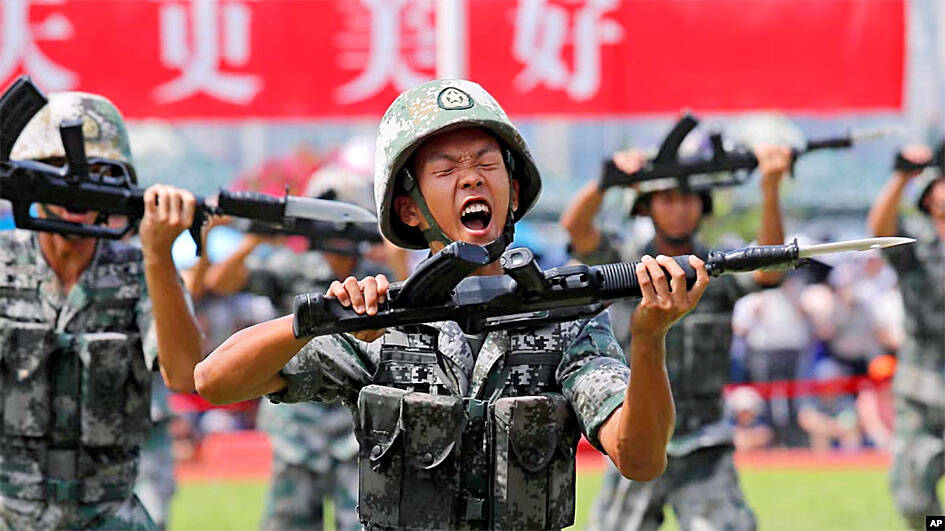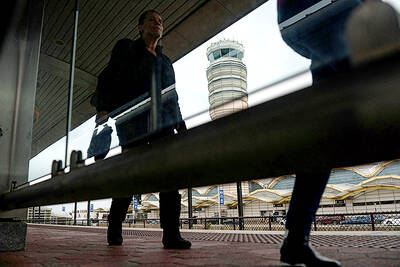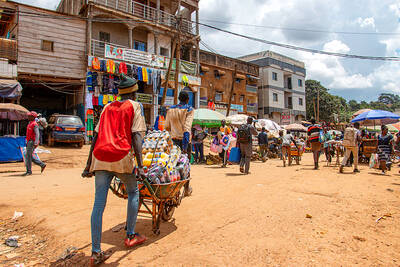At Beijing Jiaotong University’s affiliated elementary school, a class of children, maybe six or seven years old, stand in a line in a rainbow-painted hallway. A boy holds a replica handgun, and behind him, other students grasp unwieldy fake assault rifles. Fake police flak jackets cover their blue and white tracksuits, and their heads swim inside artillery helmets that are too big. In other photographs, students practice drills, salute visiting soldiers and arrange themselves on a sporting field to spell out “I [heart] u” next to a Chinese flag.
In the online post that includes the photos, published online in April, the school says it has worked hard in recent years to conscientiously “promote the main theme of patriotism, and make it an important part of the school’s ideological and political education and moral education.”
“We will create a strong atmosphere of national defense education, cultivate students’ patriotism, love for the army, and organizational discipline, and cultivate their ambitions to build and defend the motherland from an early age,” it says.

Photo: AP
The elementary school is among the thousands designated as “model schools for national defense education,” part of China’s push to increase military awareness and skills among its population — starting at younger and younger ages.
More designations announced in January by the Chinese Ministry of Education and the Central Military Commission almost doubled the number of “model schools.” They are likely to be followed by legal changes extending mandated training including “cadet activities” to students aged 15 and younger. A bill proposing amendments to the National Defense Education Law was given its first reading in the rubber-stamping Chinese National People’s Congress in April.
The amendments make more prescriptive what was previously a guide, emphasizing the need for basic military training in high schools and tertiary institutions, and allowing it to be extended to younger students for the first time.
“All state organs and armed forces, all political parties and public groups, all enterprises and institutions and grassroots self-government organizations of a mass character shall, in light of their specific conditions, organize national defense education in their respective regions, departments and units,” the draft said.
The growing emphasis on military training for civilians reflects a heightened nationalism in today’s China under Chinese President Xi Jinping (習近平), who has also made clear his distaste for what he sees as declining masculinity in China, and the worsening risk that he could take the country into war over Taiwan.
China-based analysts hsaid that the Chinese Communist Party (CCP) is learning from Russia’s war in Ukraine and the potential need to have a population that can be quickly mobilized for conflict.
Increasing militarism by China under Xi has raised the risk of conflict or hostilities with other countries, particularly over Taiwan.
At the same time its armed forces, despite undergoing a massive overhaul and modernization process, are reportedly struggling with corruption issues and low recruitment.
The Chinese Ministry of National Defense said in September last year that primary and secondary schools across the country had begun the new school year with defense education lessons, “planting a deep sense of patriotism, respect for the military and concern for national defense in the heart of students.”
It is not clear if the lessons are improving recruitment, and China’s punitive censorship culture makes it almost impossible to survey their impact on general opinion. Most published comments are similar to those of Feng Shanguo, a former soldier who took part in leading lessons at his child’s school, Neijiang No. 13 in Sichuan Province.
“It can help children to build tenacity, courage and hard-working qualities,” Feng told state media.
However, Katja Drinhausen, head of the Berlin-based think tank MERICS’ research program on Chinese policy, said military education was just one aspect of a broader campaign to boost the CCP’s strength at a time when it was facing multiple challenges including economic downturn, sporadic social unrest, multiple regional disputes and worsening natural disasters driven by climate change.
“It’s important to put together the different pieces of the broader ambition,” she said.
“There is renewed focus on military training and creating identity and buy-in from the broader population on what the military does, which also serves to build internal cohesion when the party needs to find new sources of social and political legitimacy cohesion because the economy isn’t doing it any more,” she added.

FRUSTRATIONS: One in seven youths in China and Indonesia are unemployed, and many in the region are stuck in low-productivity jobs, the World Bank said Young people across Asia are struggling to find good jobs, with many stuck in low-productivity work that the World Bank said could strain social stability as frustrations fuel a global wave of youth-led protests. The bank highlighted a persistent gap between younger and more experienced workers across several Asian economies in a regional economic update released yesterday, noting that one in seven young people in China and Indonesia are unemployed. The share of people now vulnerable to falling into poverty is now larger than the middle class in most countries, it said. “The employment rate is generally high, but the young struggle to

ENERGY SHIFT: A report by Ember suggests it is possible for the world to wean off polluting sources of power, such as coal and gas, even as demand for electricity surges Worldwide solar and wind power generation has outpaced electricity demand this year, and for the first time on record, renewable energies combined generated more power than coal, a new analysis said. Global solar generation grew by a record 31 percent in the first half of the year, while wind generation grew 7.7 percent, according to the report by the energy think tank Ember, which was released after midnight yesterday. Solar and wind generation combined grew by more than 400 terawatt hours, which was more than the increase in overall global demand during the same period, it said. The findings suggest it is

IN THE AIR: With no compromise on the budget in sight, more air traffic controllers are calling in sick, which has led to an estimated 13,000 flight delays, the FAA said Concerns over flight delays and missed paychecks due to the US government shutdown escalated on Wednesday, as senators rejected yet another bid to end the standoff. Democrats voted for a sixth time to block a Republican stopgap funding measure to reopen government departments, keeping much of the federal workforce home or working without pay. With the shutdown in its eighth day, lines at airports were expected to grow amid increased absenteeism among security and safety staff at some of the country’s busiest hubs. Air traffic controllers — seen as “essential” public servants — are kept at work during government shutdowns, but higher numbers

Elvis Nghobo tried to get into four different professional schools in Cameroon, but could not make it. Frustrated, the 34-year-old turned to selling food at a market in Yaounde, the country’s seat of power. Nghobo blames his woes on what he calls a corrupt education system that favors children of the elite. As the central African country prepares for Sunday’s presidential election, he said he would not be heading out to vote. He called the results a foregone conclusion for 92-year-old Paul Biya, the world’s oldest president, who has ruled for Nghobo’s entire life. “He is already too old to govern, and it’s boring